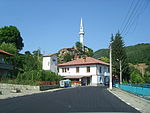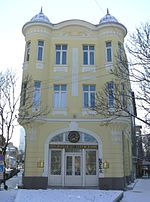- Islam in Bulgaria
-
Islam is the largest minority religion in Bulgaria. According to the 2001 Census, the total number of Muslims in the country stood at 577,139[1], corresponding to 10 % of the population. The Muslim population of Bulgaria, which is made up of Turks, Bulgarians and Roma lives mainly in parts of northeastern Bulgaria and of the Rhodope Mountains.[2]
Contents
Muslims in Bulgaria according to ethnic group
According to the criterion of ethnicity, Muslims in Bulgaria were divided into the following groups in 2001:[3]
Most of the Muslims in Bulgaria are Sunni Muslims as Sunni Islam was the form of Islam promoted by the Ottoman Empire during their five-century rule of Bulgaria (see History of Bulgaria). Shi'a sects such as the Alians, Kizilbashi and the Bektashi also are present, however. About 80,000 Shi'a Muslims live mainly in the Razgrad, Sliven and Silistra provinces.
Though the Ahmadiyya Muslim Community is a small sect in Bulgaria, their practice as Ahmadi Muslims is debarred due to the disagreement in belief between the majority Muslims.[4]
The largest mosque in Bulgaria is the Tumbul Mosque in Shumen, built in 1744.
History of Islam in Bulgaria
The first documented Muslim contacts with Bulgaria are dated to the mid-ninth century when there were Islamic missionaries in Bulgaria, evidenced by a letter from Pope Nicholas to Boris of Bulgaria that the Saracens must be extirpated.[5] During the time of Tsar Simeon insignificant Islamic influences on Bulgarian art began to appear, though it is believed that these can be traced to Byzantine influence.[6] Later during the 11th and 12th centuries, nomadic Turkic tribes such as the Cumans and the Pechenegs entered Bulgaria and engaged the Byzantine Empire. According to scholars, some of these were Muslim.[7][8] The Orthodox Christian Gagauzes are also purported to originate from the Cumans and Pechenegs[9]
Migration of Muslim Seljuq Turks to Dobruja during the 13th century is also mentioned.[10] In 1362, Ottoman Empirate captured the city of Adrianople (present-day Edirne) and with in the next two years they had advanced as far as Plovdiv. The city of Sofia fell in 1385. Islam established in the conquered Bulgarian lands in the late 14th century at the Ottoman rule of the Balkans, its' spreading growed until the Liberation of Bulgaria in the late 19th century after the Russo-Turkish War.[11] According to the office of the Grand Mufti in Sofia during the Turkish Ottoman rule in Bulgaria there were 2356 mosques, 174 tekke, 142 madrasah and 400 waqf. After the Russo-Turkish War, many Islamic properties were either destroyed or confiscated for civilian use.[12] Currently there are 1458 mosques in Bulgaria.[13]
Like the practitioners of other beliefs including Orthodox Christians, Muslims suffered under the restriction of religious freedom by the Marxist-Leninist Zhivkov regime which instituted state atheism and suppressed religious communities. The Bulgarian communist regimes declared traditional Muslim beliefs to be diametrically opposed to secular communist ideology. In 1989,[14] 310,000 Turks fled Bulgaria as a result of the communist Zhivkov regime's assimilation campaign. That program, which began in 1984, forced all Turks and other Muslims in Bulgaria to adopt Bulgarian names and renounce all Muslim customs. The motivation of the 1984 assimilation campaign was unclear; however, many experts believed that the disproportion between the birth rates of the Turks and the Bulgarians was a major factor.[15] After the breakdown of communism, Muslims in Bulgaria again enjoyed greater religious freedom. Some villages organized Qur'an study courses for young people (study of the Qur'an had been completely forbidden under Zhivkov). Muslims also began publishing their own newspaper, Musulmani, in both Bulgarian and Turkish.
See also
Further reading
- Ragaru, Nadege (June 2001). "Islam in post-communist Bulgaria: An aborted "clash of civilizations"?". Nationalities Papers 29 (2): 293–324. doi:10.1080/00905990120053755.
- Kristen R. Ghodsee, Muslim Lives in Eastern Europe: Gender, Ethnicity and the Transformation of Islam in Postsocialist Bulgaria, Princeton University Press, 2009. isbn = 978-0-691-13955-5
References
- ^ 2011 Bulgarian census (in Bulgarian)
- ^ http://www.nsi.bg/Census/Census.htm
- ^ http://www.nccedi.government.bg/page.php?category=92&id=247
- ^ "Ahmadis barred “because it is against the religions that people follow here”". thePersecution. http://www.thepersecution.org/news/2006/f18n1122.html. Retrieved 28 October 2010.
- ^ H. T. Norris: "Islam in the Balkans: religion and society between Europe and the Arab world" 1993 pp.21-27
- ^ H. T. Norris: "Islam in the Balkans: religion and society between Europe and the Arab world" 1993 pp.21-22
- ^ Ali Eminov: "Turkish and other Muslim minorities in Bulgaria" 1997 pp.25
- ^ H. T. Norris: "Islam in the Balkans: religion and society between Europe and the Arab world" 1993 pp.26
- ^ Searching for the Origin of Gagauzes: Inferences from Y-Chromosome Analysis
- ^ H. T. Norris: "Islam in the Balkans: religion and society between Europe and the Arab world" 1993
- ^ R. J. Crampton: "A short history of modern Bulgaria" 1987
- ^ Office of the Grand Mufti - Sofia:Müslümanlar Publication 5/2009
- ^ Office of the Grand Mufti - Sofia:Müslümanlar Publication 11/2009
- ^ See in Bulgarian: Stoyanov, V., Turskoto naselenie v Balgariya mezhdu polyusite na etnicheskata politika [The Turkish population between the poles of ethnic politics], (Sofia: LIK, 1998); Gruev, M., Mezhdu petolachkata i polumesetsa: Balgarite myusyulmani i politicheskiya rezhim (1944-1959) [Between the Five-pointed Star and the Crescent: The Bulgarians-Muslims and the Political Regime (1944-1959],(Sofia: IK “KOTA”, 2003); Kalkandjieva, D., The Bulgarian Communist Party’s Policies towards the Non-Orthodox Religious Communities (1944-1953),” Trudove na katedrite po istoria i bogoslovies [Historical and Theological Studies Department of Shumen University], v. 8 (2005): 252-264; Gruev M. and A. Kalyonski, Vazroditelniyat protses: Myusyulmanskite obshtnosti i komunisticheskiya rezhim [The “Revival Process”. Muslim Communities and the Communist Regime: Policies, Reactions and Consequences] (Sofia: CIELA, 2008).
- ^ Glenn E. Curtis, ed. Bulgaria: A Country Study. Washington: GPO for the Library of Congress, 1992
 This article incorporates public domain material from websites or documents of the Library of Congress Country Studies.
This article incorporates public domain material from websites or documents of the Library of Congress Country Studies.
Islam in Europe Sovereign
states- Albania
- Andorra
- Armenia
- Austria
- Azerbaijan
- Belarus
- Belgium
- Bosnia and Herzegovina
- Bulgaria
- Croatia
- Cyprus
- Czech Republic
- Denmark
- Estonia
- Finland
- France
- Georgia
- Germany
- Greece
- Hungary
- Iceland
- Ireland
- Italy
- Kazakhstan
- Latvia
- Liechtenstein
- Lithuania
- Luxembourg
- Macedonia
- Malta
- Moldova
- Monaco
- Montenegro
- Netherlands
- Norway
- Poland
- Portugal
- Romania
- Russia
- San Marino
- Serbia
- Slovakia
- Slovenia
- Spain
- Sweden
- Switzerland
- Turkey
- Ukraine
- United Kingdom
- (England
- Northern Ireland
- Scotland
- Wales)
- Vatican City
States with limited
recognition- Abkhazia
- Kosovo
- Nagorno-Karabakh
- Northern Cyprus
- South Ossetia
- Transnistria
Dependencies
and other territories- Åland
- Faroe Islands
- Gibraltar
- Guernsey
- Jan Mayen
- Jersey
- Isle of Man
- Svalbard
Other entities Categories:
Wikimedia Foundation. 2010.


